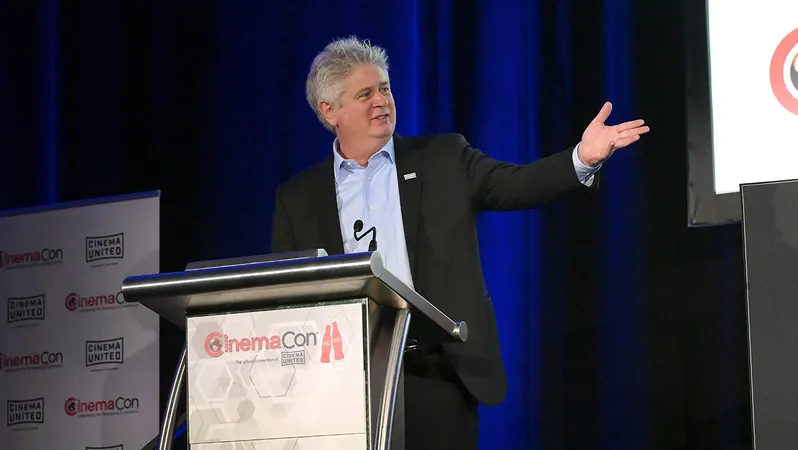
Theater Industry's Bold New Push for Extended Exclusive Release Windows: Will It Revive Cinema?
2025-04-01
Author: Wai
The Call for Change
In a fervent call to arms, Michael O’Leary, president and CEO of Cinema United, the world’s largest trade organization for theater owners, has declared a significant shift in the ongoing battle over theatrical release windows. Speaking at CinemaCon, O’Leary urged for a return to a traditional 45-day exclusive run in theaters before films can be made available for home viewing.
Pandemic Era Challenges
The pressure on the industry has escalated ever since pandemic-era practices initiated a trend that shortened exclusive theatrical windows to as little as 17 or 31 days for blockbuster titles. O’Leary's insistence on a 45-day minimum aims to reverse this trend. He highlighted the negative impact of reduced theatrical runs on audience engagement, stating, “The perception that films will soon be available elsewhere undermines the sustainability of the industry by discouraging fans from visiting theaters.”
Audience Awareness Decline
Citing alarming data, O’Leary pointed out that recent audience awareness of new films has plummeted by 38% over opening weekends. 'We need to elevate audience awareness of new releases,' he emphasized, proposing that collaboration between studios and theater operators is key to fortifying marketing strategies. He urged the cessation of promotions that drive viewers to home viewing options while films are still in theaters, asserting, '‘At-home’ should never be the default option when a film is available in thousands of theaters.'
Revenue Disparities
The urgency of this shift comes at a crucial time. As O’Leary observed, the disparity between box office revenue pre- and post-pandemic is stark, with revenues for the top 20 films dropping 10%, while mid-tier films saw an astonishing 32% decline. He posited that a longer window could mitigate these losses and, even more significantly, yield additional revenue for the theater industry. 'If we can maintain the box office performance of smaller films, we could add over $1 billion to annual revenue,' he declared passionately.
Calls for Collaboration
Despite the challenges posed by antitrust regulations, O’Leary's bold strike claims the industry needs to evolve and find common ground. He called upon both theaters and studios to engage in meaningful discussions, insisting that a mutually beneficial structure serves the entire filmmaking ecosystem.
Industry Divide
Key industry players appear divided on this issue. While top executives from Disney and Sony echoed O'Leary’s sentiment about the drastic need for longer windows to support theatrical releases, others in the industry argue that the rapid changes initiated during the pandemic have fundamentally altered viewer habits.
Conclusion: The Future of Cinema
With a call-to-action reverberating throughout the theater community, O’Leary concluded his address by reaffirming the need for collaboration and innovative thinking to revitalize the cinema experience. 'We must adapt and evolve if we want to secure a prosperous future for the theatrical business,' he said, rallying leaders to come together to ensure that the magic of cinema on big screens remains alive and thriving.
As the industry grapples with these challenges, one question remains: can theaters reclaim their place at the heart of entertainment in the age of streaming? Only time will tell if O’Leary's vision will usher in a new era for the cinematic experience.


 Brasil (PT)
Brasil (PT)
 Canada (EN)
Canada (EN)
 Chile (ES)
Chile (ES)
 Česko (CS)
Česko (CS)
 대한민국 (KO)
대한민국 (KO)
 España (ES)
España (ES)
 France (FR)
France (FR)
 Hong Kong (EN)
Hong Kong (EN)
 Italia (IT)
Italia (IT)
 日本 (JA)
日本 (JA)
 Magyarország (HU)
Magyarország (HU)
 Norge (NO)
Norge (NO)
 Polska (PL)
Polska (PL)
 Schweiz (DE)
Schweiz (DE)
 Singapore (EN)
Singapore (EN)
 Sverige (SV)
Sverige (SV)
 Suomi (FI)
Suomi (FI)
 Türkiye (TR)
Türkiye (TR)
 الإمارات العربية المتحدة (AR)
الإمارات العربية المتحدة (AR)